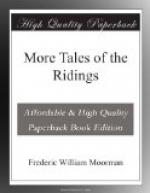It was Learoyd. The wretched man, tortured by a sense of guilt, and obsessed with the idea that Mary Whittaker’s act of sacrifice was a cold-blooded device to shame him and aggravate his misery, had hanged himself, choosing as the scene of his death the spot where, fifteen years before, he had exposed his stepdaughter for sale. In so doing, his warped imagination assured him that the coals of fire which seared his brain would henceforth be poured upon the head of Mary Whittaker.
Such was the end of Samuel Learoyd. If there was stern retribution in his death so was there also malign mockery. The chalice of pardon and peace was filled for him, but before he could raise the cup to his lips a fiendish hand had dashed it to the ground and substituted in its place a draught of venomous hemlock.



